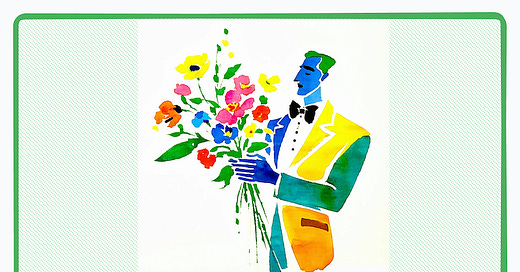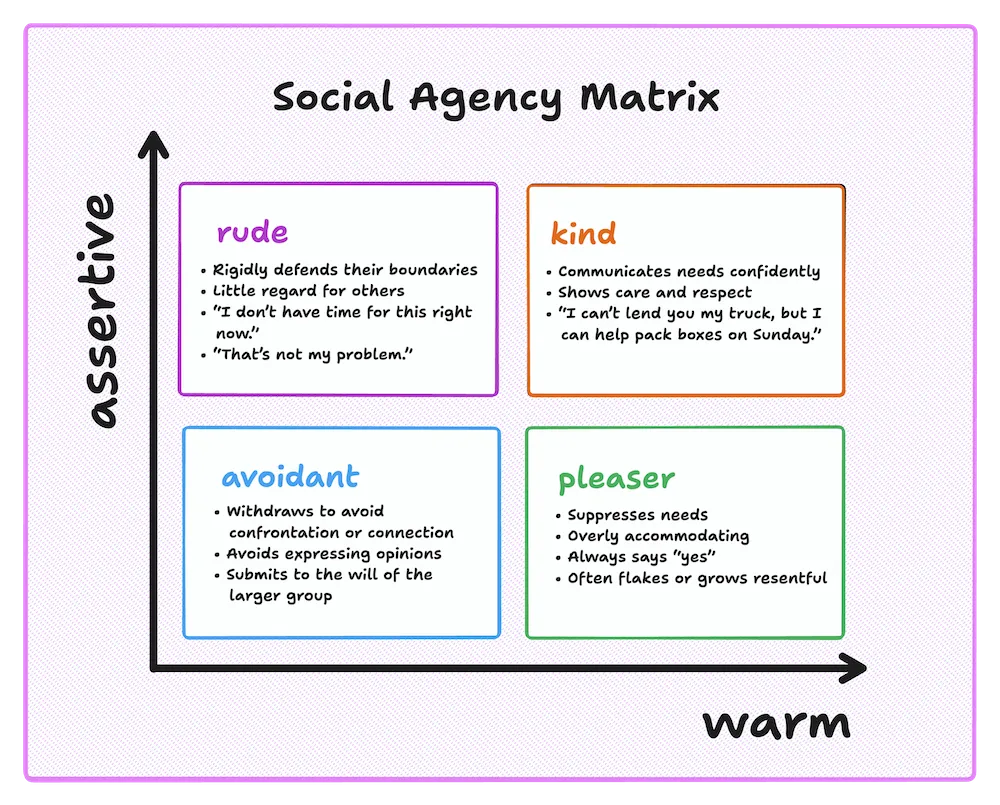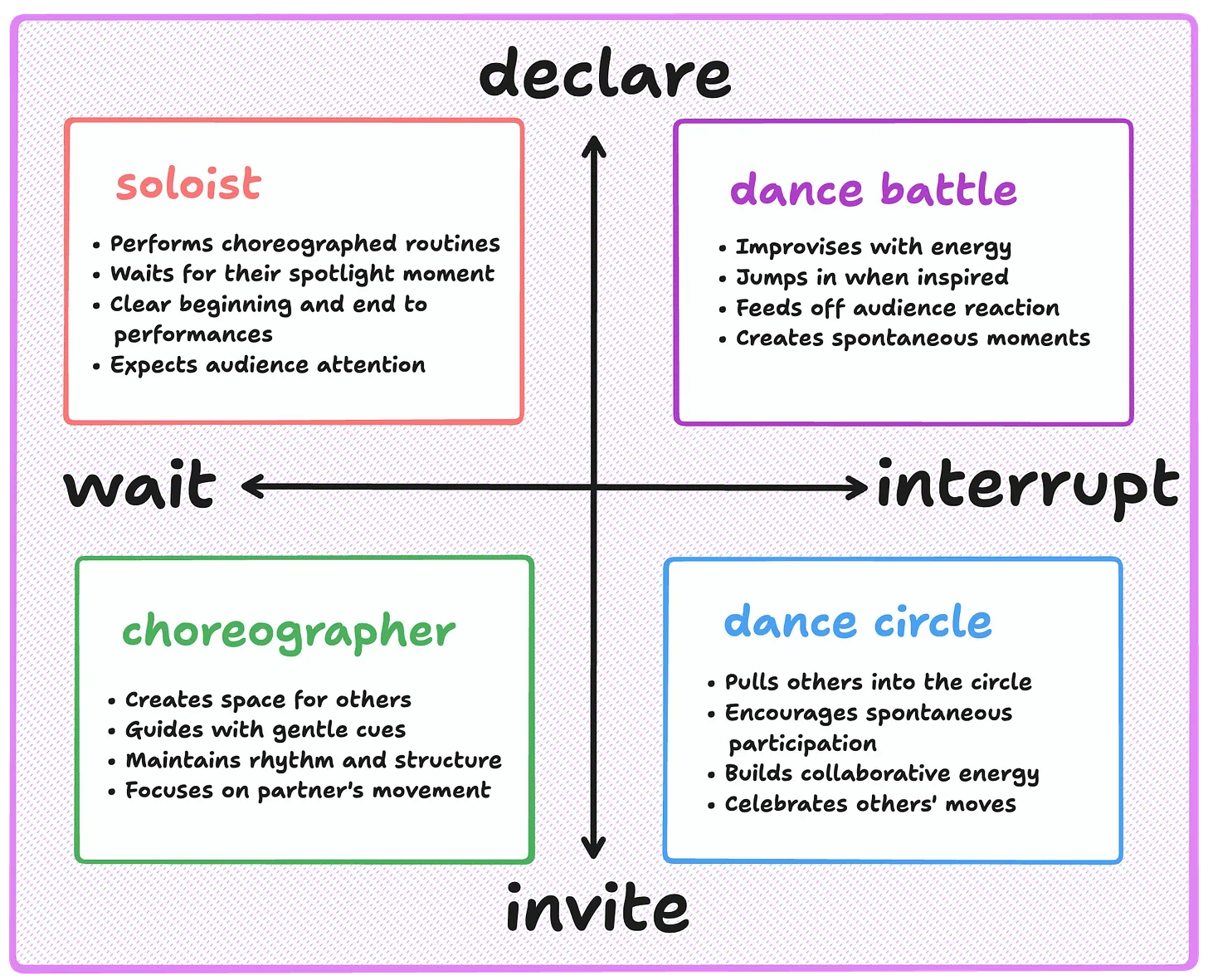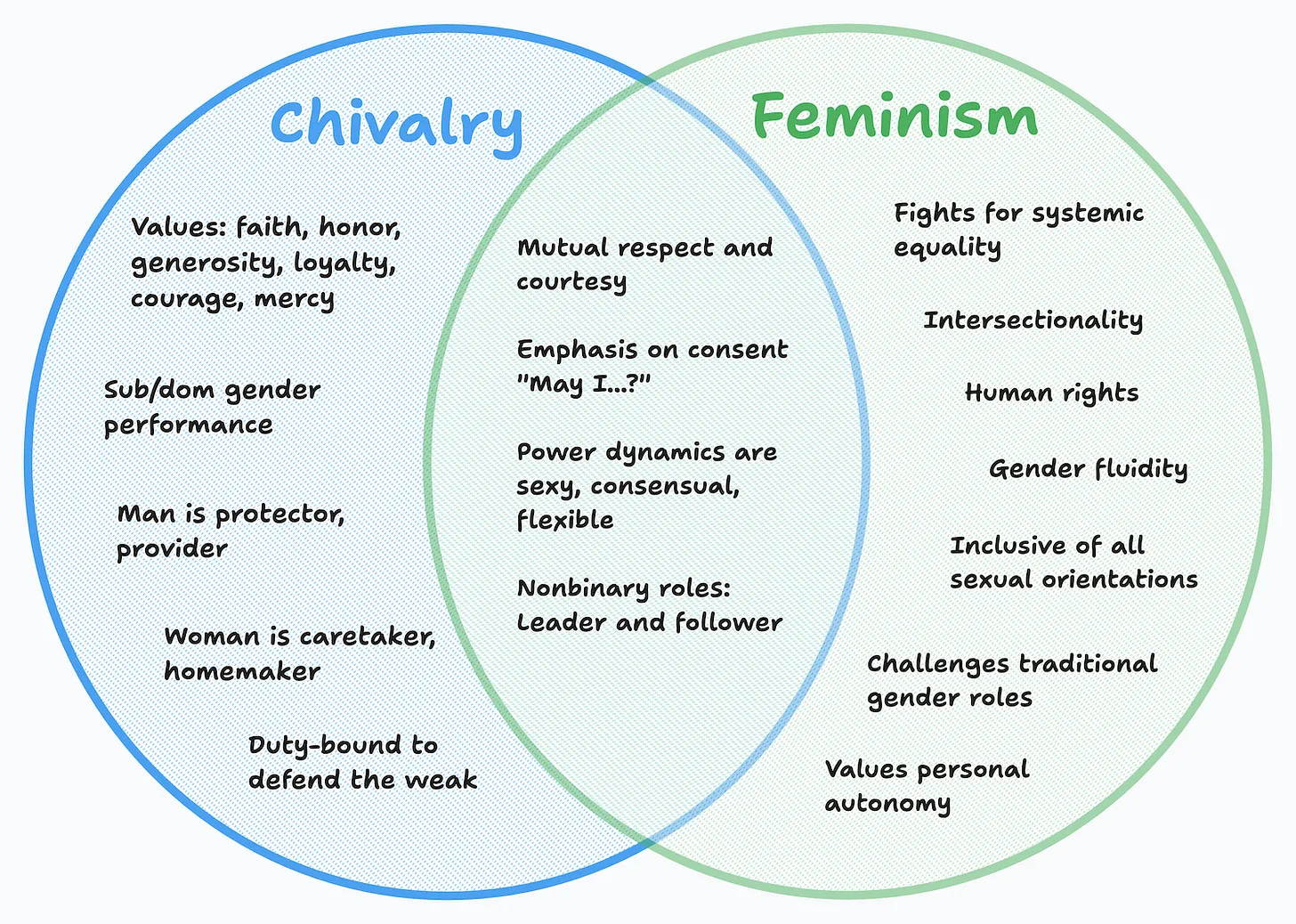Hello and welcome to the finale episode of The Ick season 3. Part how-to guide, part recap, I’ve collected the best advice from the 12-article season to create the ultimate guide to being a gentleman.
A gentleman is an exceptionally attractive person. They have a social ease, self-assurance, and charismatic kindness that feels effortless and disarming. Everyone and anyone can be a gentleman.
I started this series because we’re experiencing a social skills vacuum. You’ve read about the soft skills crisis and the loneliness epidemic; The Atlantic recently christened us the anti-social century. I believe a lot of this is moral panic, but beneath the sensationalizing, there’s clearly a real problem. Arguments about the cause—video games, smartphones, AI girlfriends, defunding public spaces—are fractured and polarized, but the most likely cause is all of them. We don’t yet know all the costs and benefits of becoming an extremely online, AI-enabled, pandemic-vulnerable global society. And the kids are not alright.
But, honestly, where are we supposed to learn this stuff? Etiquette training is a relic, gatekept by rich elites. Self-help and “social influence theory” books are written by hacks and creeps. And social media influencers are even more fake and toxic. Where are the resources for caring, constructive advice? Manosphere rhetoric, for all its hateful misogyny, is popular in part because it’s instructive and clear. Men with big muscles and small pants explain how to get paid and get laid—and it involves Saratoga water for some reason. Where are the practical, prescriptive resources for everyone else?
After moving to San Francisco a year and half ago, I met too many genius computer programmers with bad table manners and worse handshakes. And I realized many millennials and zoomers simply never learned these skills. The pandemic threw social norms into chaos right as many of us were coming of age. There was a period (years!) where we didn’t shake hands at all—we were elbow tapping for chrissakes. Plus, dating moved entirely online, and the Me Too movement, for all the amazing social progress and protections it initiated, introduced new anxieties about dating, flirtation, and casual sex.
No wonder we’re confused. Concepts like consent and power dynamics are still being worked out in real-time, shaped by ongoing social ferment. Like Grimes tweeted recently, “We have no idea what’s going on. Civilization is new, hardly stress tested.” (Also, “We have no illuminati.”)
Lack of social skills shouldn’t be cast as a moral failing. It’s not anyone’s fault individually. But it’s our collective responsibility to fix it. Rules of conduct aren’t meant to homogenize. Instead, they’re guides to create mutual understanding and ease. When everyone has basic expectations for acting kind and respectful, Emily Post argues, we create the Best Society.
“Best Society is not a fellowship of the wealthy, nor does it seek to exclude those who are not of exalted birth,” Post wrote in 1922, “but it is an association of gentle-folk, of which good form in speech, charm of manner, and instinctive consideration for the feelings of others, are the credentials by which society the world over recognizes its chosen members.”
Don’t be “nice”
A big gripe about kids these days is that we’re rude. We don’t say thank you or excuse me, we flake and ghost instead of politely declining. Whether or not we’re measurably more rude is debatable. But, what’s important is striking a balance. A gentleman is neither rude nor overly nice. Neither a jerk nor a pushover.
Here’s the formula: assertiveness + warmth = kind. Assertiveness allows you to communicate your needs clearly and hold firm boundaries. It’s the antidote to people pleasing. Warmth fosters connection and likeability—the antidote to rudeness. When you have both in healthy proportions, the result is social agency.
Read the full story here:
Pay the check
A gentleman knows how to handle the bill elegantly and without fuss. Regardless of your gender or romantic entanglement, this rule is the gold standard: your invitation, your bill.
When to pay:
If you invite, you pay. Or, when dating: if you penetrate, you pay. No exceptions:)
When to split:
If the invitee is significantly wealthier and insists on paying (see rule #8: gently compete for the bill)
If a clear precedent or understanding exists (e.g. a bachelorette brunch, a large group dinner)
If your invitation explicitly signals that the other should pay (i.e. “You should take me out for sushi on Friday”)
There are edge cases and nuances, especially when it comes to Venmo. The full discussion is here:
Give great compliments
A gentleman knows how to give compliments freely, not creepily. The difference between compliments and flattery is crucial: compliments are altruistic, given without expectation, while flattery is tactical, meant to manipulate.
Complimenting others authentically signals confidence and emotional intelligence, making you more approachable and likable. By practicing compliments, you enhance your ability to build trust and foster social connections, which will pay off in all areas of your life, from persuasion and upward mobility, to romantic relationships.
Learn the dos and don’ts here:
Harness the technology of makeup and skincare
Attractive people make more money, appear more likeable and trustworthy, and are less likely to be arrested. Makeup and skincare are tools to leverage this social bias. If there is a lever for more beauty privilege, why not use it?

More importantly, taking care of yourself signals self-worth and conscientiousness, which are deep-seated biological cues. In romance, it’s a sign of self-respect and care for your future, qualities that suggest you’ll bring the same thoughtfulness and intention to the partnership.
A gentleman knows the fundamentals of how and why makeup works, and how to wear it (men can wear makeup too, don’t be dumb):
There are so many great resources on why and how to start a skincare routine (especially for men). This one is the GOAT for the boys.
Be an effortless conversationalist
The hallmark of a gentleman is the ability to hold engaging conversation. How are you going to attract the love of your life if you’re hiding in the corner, or worse, blathering loudly without letting them speak? Learning to be a charismatic and charming conversationalist is easy to hack. Here are the highlights:
Know the underlying structure
There are three unspoken questions beneath every interaction:
Are you listening to me?
Do you care about me?
Can I trust you?
When these needs go unmet, conversations fail. When these needs are met, people feel excited and engaged by talking to you.
Practice these 4 essential skills
Create "doorknobs”
Find their stories
Show genuine curiosity
Gradual self-disclosure
Read the full article here:
Know your conversation style
To be a great conversationalist, you must also understand two essential dynamics: your style—declarative vs invitational, and ethic—wait vs interrupt. No style or ethic is wrong or right. Your conversational approach is influenced by the cultural norms and values you grew up in. The goal is knowing who you’re compatible with and how to adapt to others.
This was the first article in season 3 and one of the most-read of the series. Don’t miss it:
Shake hands firmly
In the gentlemanly quest to be socially agentic, you must have a warm and assertive handshake. A bad handshake is a red flag and a deal-breaker—it could cost you a career-changing first-impression, or worse, your soulmate. Under no circumstances should you give a limp wrist or crab claw.
Here’s a step-by-step breakdown of how to do it confidently:
Don't chew with your mouth open
Seems like an obvious one. But so many people eat like Garfield the Cat. Table manners are a powerful way to show your confidence, charm, and elegance.
Additionally, for those with anthropological curiosity, the history and logic of table manners is fascinating. Examine any rule, and you'll find its basic function is to prevent either contamination or violence. Here’s a comprehensive guide:
Don’t arrive empty-handed
This rule was mentioned in the article linked above, but bears specific mention. If someone invites you to a dinner, birthday, or house party you should bring something. Especially if they say, “Oh no, don’t bring anything!” you should definitely bring something.
Unless you’re dropping in on a close friend or relative, you shouldn’t arrive empty handed. Grab a bottle of wine, a handful of flowers, a bar of chocolate, a mason jar of kombucha, a couple of tallboys—it doesn’t matter how small, it’s the gesture that’s important. A gift acknowledges the host’s hospitality, and offers a token contribution in thanks. If you do this regularly, I promise your charisma score will shoot through the roof.
Do not ghost
A big part of why younger generations are perceived as rude is that we’re increasingly conflict avoidant. Digital interfaces give us anonymity, and it’s atrophying our ability to have mature, direct conversations—like breakups.
Ghosting is spineless behavior. Have some respect for yourself and the person you’re rejecting, and just be direct. A breakup text can be warm and assertive! It’s actually the kindest, most gentlemanly thing to do.
However, ghosting is allowed under limited circumstances. Here are the rules:
Open the door
Chivalry is hot. But in today’s environment, a gentleman must tread carefully. For chivalry to work, no matter your gender, you need the power dynamics of a partner dance: someone leads, the other follows.
How this looks in practice:
When approaching the door
The leader should stride slightly ahead, open it confidently, and say, “After you.”When exiting a car
Make eye contact with your passenger and say, “Let me get the door for you,” before walking around to their side.If you want to get their coat or pull out their chair
As you begin the movement ask, “May I get that for you?” This leaves space for them to decline or consent. If they say, “No, really, I got it” you would then graciously back off.
The chivalrous person acts with assertiveness and grace. The action is not about dominance, it’s about care and connection. The full analysis is here:
A huge thank you to everyone who has read, liked, and shared an article this season. I’ve had so much fun exploring the history and evolution of etiquette, and I hope it’s been helpful to you in some small way.
Researching this topic has lit up a sense of urgency in me. I realize that our generations have the opportunity to rewrite social norms that better serve us and the future we’re building. After emerging from a pandemic into a so-called fourth industrial revolution, we’re living in a time of incredible social plasticity. We can dismantle harmful gender stereotypes, redefine professionalism, and make etiquette relevant to our IRL and digital lives.
Nineteenth and 20th century etiquette was used to gatekeep and reinforce class hierarchy. But we’re done with that shit. No more prioritizing performative politeness over kindness, and silence over accountability. I believe we can course correct from rude and antisocial to gracious and gentlemanly. As Derek Thompson wrote in The Atlantic, “Our smallest actions create norms. Our norms create values. Our values drive behavior. And our behaviors cascade.”
I recognize that new norms are still taking shape, so consider this guide a working draft.
Thank you for reading The Ick Season 3. See the full season here. If you haven’t already, please subscribe so you don’t miss the Season 4 announcements coming soon. Love y’all.


















